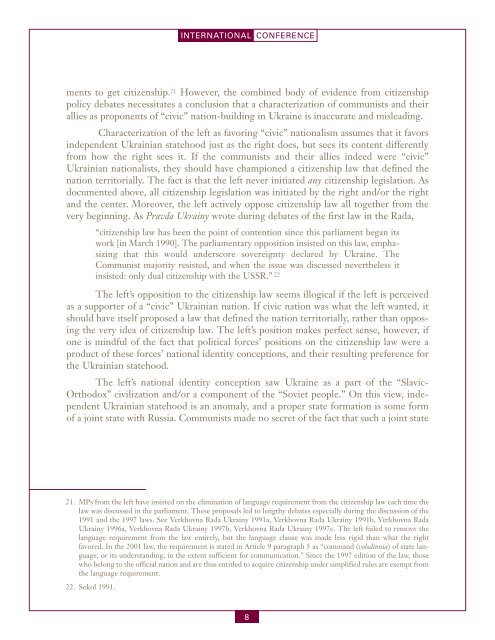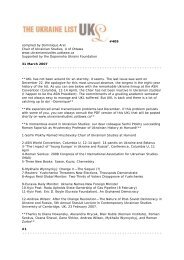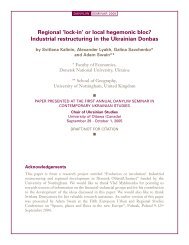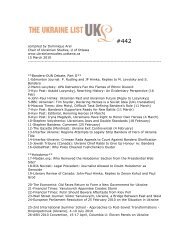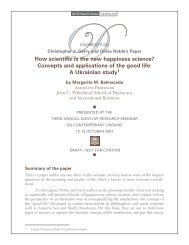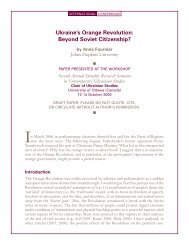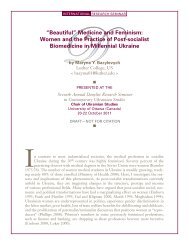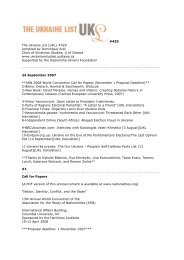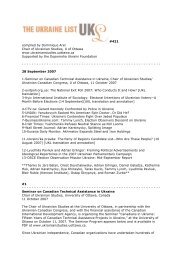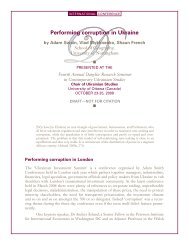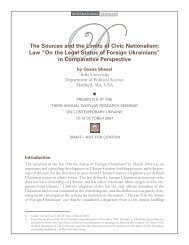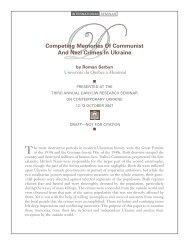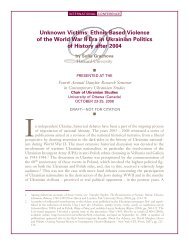Citizenship and nation-building in Ukraine - Chair of Ukrainian Studies
Citizenship and nation-building in Ukraine - Chair of Ukrainian Studies
Citizenship and nation-building in Ukraine - Chair of Ukrainian Studies
Create successful ePaper yourself
Turn your PDF publications into a flip-book with our unique Google optimized e-Paper software.
INTERNATIONAL CONFERENCE<br />
ments to get citizenship. 21 However, the comb<strong>in</strong>ed body <strong>of</strong> evidence from citizenship<br />
policy debates necessitates a conclusion that a characterization <strong>of</strong> communists <strong>and</strong> their<br />
allies as proponents <strong>of</strong> “civic” <strong>nation</strong>-<strong>build<strong>in</strong>g</strong> <strong>in</strong> Ukra<strong>in</strong>e is <strong>in</strong>accurate <strong>and</strong> mislead<strong>in</strong>g.<br />
Characterization <strong>of</strong> the left as favor<strong>in</strong>g “civic” <strong>nation</strong>alism assumes that it favors<br />
<strong>in</strong>dependent Ukra<strong>in</strong>ian statehood just as the right does, but sees its content differently<br />
from how the right sees it. If the communists <strong>and</strong> their allies <strong>in</strong>deed were “civic”<br />
Ukra<strong>in</strong>ian <strong>nation</strong>alists, they should have championed a citizenship law that def<strong>in</strong>ed the<br />
<strong>nation</strong> territorially. The fact is that the left never <strong>in</strong>itiated any citizenship legislation. As<br />
documented above, all citizenship legislation was <strong>in</strong>itiated by the right <strong>and</strong>/or the right<br />
<strong>and</strong> the center. Moreover, the left actively oppose citizenship law all together from the<br />
very beg<strong>in</strong>n<strong>in</strong>g. As Pravda Ukra<strong>in</strong>y wrote dur<strong>in</strong>g debates <strong>of</strong> the first law <strong>in</strong> the Rada,<br />
“citizenship law has been the po<strong>in</strong>t <strong>of</strong> contention s<strong>in</strong>ce this parliament began its<br />
work [<strong>in</strong> March 1990]. The parliamentary opposition <strong>in</strong>sisted on this law, emphasiz<strong>in</strong>g<br />
that this would underscore sovereignty declared by Ukra<strong>in</strong>e. The<br />
Communist majority resisted, <strong>and</strong> when the issue was discussed nevertheless it<br />
<strong>in</strong>sisted: only dual citizenship with the USSR.” 22<br />
The left’s opposition to the citizenship law seems illogical if the left is perceived<br />
as a supporter <strong>of</strong> a “civic” Ukra<strong>in</strong>ian <strong>nation</strong>. If civic <strong>nation</strong> was what the left wanted, it<br />
should have itself proposed a law that def<strong>in</strong>ed the <strong>nation</strong> territorially, rather than oppos<strong>in</strong>g<br />
the very idea <strong>of</strong> citizenship law. The left’s position makes perfect sense, however, if<br />
one is m<strong>in</strong>dful <strong>of</strong> the fact that political forces’ positions on the citizenship law were a<br />
product <strong>of</strong> these forces’ <strong>nation</strong>al identity conceptions, <strong>and</strong> their result<strong>in</strong>g preference for<br />
the Ukra<strong>in</strong>ian statehood.<br />
The left’s <strong>nation</strong>al identity conception saw Ukra<strong>in</strong>e as a part <strong>of</strong> the “Slavic-<br />
Orthodox” civilization <strong>and</strong>/or a component <strong>of</strong> the “Soviet people.” On this view, <strong>in</strong>dependent<br />
Ukra<strong>in</strong>ian statehood is an anomaly, <strong>and</strong> a proper state formation is some form<br />
<strong>of</strong> a jo<strong>in</strong>t state with Russia. Communists made no secret <strong>of</strong> the fact that such a jo<strong>in</strong>t state<br />
21. MPs from the left have <strong>in</strong>sisted on the elimi<strong>nation</strong> <strong>of</strong> language requirement from the citizenship law each time the<br />
law was discussed <strong>in</strong> the parliament. These proposals led to lengthy debates especially dur<strong>in</strong>g the discussion <strong>of</strong> the<br />
1991 <strong>and</strong> the 1997 laws. See Verkhovna Rada Ukra<strong>in</strong>y 1991a, Verkhovna Rada Ukra<strong>in</strong>y 1991b, Verkhovna Rada<br />
Ukra<strong>in</strong>y 1996a, Verkhovna Rada Ukra<strong>in</strong>y 1997b, Verkhovna Rada Ukra<strong>in</strong>y 1997c. The left failed to remove the<br />
language requirement from the law entirely, but the language clause was made less rigid than what the right<br />
favored. In the 2001 law, the requirement is stated <strong>in</strong> Article 9 paragraph 5 as “comm<strong>and</strong> (volod<strong>in</strong>nia) <strong>of</strong> state language,<br />
or its underst<strong>and</strong><strong>in</strong>g, <strong>in</strong> the extent sufficient for communication.” S<strong>in</strong>ce the 1997 edition <strong>of</strong> the law, those<br />
who belong to the <strong>of</strong>ficial <strong>nation</strong> <strong>and</strong> are thus entitled to acquire citizenship under simplified rules are exempt from<br />
the language requirement.<br />
22. Sokol 1991.<br />
8


